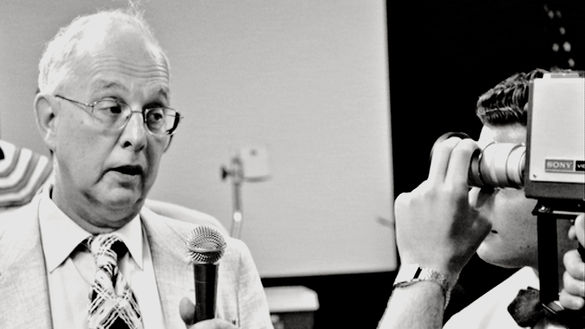By Armond White
Whatever else is going on in Andrew Bujalski’s Computer Chess (now playing at Film Forum), it is also–unmistakably–a satire on film culture’s extinction. The weird weekend gathering of chess and computer geeks at an early 80s conference (they’re testing whether a machine can outplay a human being) is deliberately antique-looking; it becomes a hermetic curio when the conference’s leader shows up, played by Gerald Peary, formerly a film reviewer for the now defunct Boston Pheonix who had tried his own hand at indie filmmaking with a little-known documentary on the critical profession.
 As chess master Pat Henderson, the professorial Peary is first seen chastising Bujalski’s cameramen: “Hey! Do not ever shoot at the sun! You’re gonna burn out the tube! You’re gonna shoot the rest of the weekend inside. We want to be only inside. That’s it.” And Bujalski stays only inside the insular world of nerds: pale, sweaty guys, all with bad shag, bowl, stringy haircuts or balding. (Yesterday’s high school audio-visual geeks today claim hipness like The Onion’s AV Club.) Computer Chess’s mockumentary style gets almost surreally deadpan.
As chess master Pat Henderson, the professorial Peary is first seen chastising Bujalski’s cameramen: “Hey! Do not ever shoot at the sun! You’re gonna burn out the tube! You’re gonna shoot the rest of the weekend inside. We want to be only inside. That’s it.” And Bujalski stays only inside the insular world of nerds: pale, sweaty guys, all with bad shag, bowl, stringy haircuts or balding. (Yesterday’s high school audio-visual geeks today claim hipness like The Onion’s AV Club.) Computer Chess’s mockumentary style gets almost surreally deadpan.
The point of Computer Chess is to embrace the uncool, that’s the source of Bujalski’s affection and his humor. It’s also surreally sexless, contrasting the nerds’ arcana with a peculiar, aggressive human potential cult sharing the same hotel and ballroom space. (Their skirmishes recall the War Room fracases of Kubrick’s Dr. Strangelove.) The mumbled dialogue is recorded in a muffle, a eunuchy euphony true to the anti-social fascination with technology that defines dweebness. Computer Chess uncannily replicates contemporary film culture types, especially the species of criticism. Bujalski exposes a realm as insular and unappealing as eavesdropping on a confab of film critics (as Peary’s doc meant to do). Set prior to the Internet, Computer Chess preserves a fossilized world in old-fashioned (analog) amber.
Who would want to see this thing besides other film nerds? Perhaps only Mumblecore cultists who naively mistake spartan video technique with cinema esthetics. This time Bujalski displays unusual stylistic self-consciousness–black & white video tape imagery, compositions that fake real-time realism plus out-of-focus shots, white & black reverse images, inserts that comment upon the banality of ancient TV style, including showing off old-time beta-cams, overhead projectors, bulky cathode ray tube monitors and computer fonts and crude chyrons. Mumblecore’s standard indifference to aesthetics is explained by this look at primitive technology of the past; it becomes the basis for Mumblecore’s presumption that all aesthetics are arbitrary. “Innovation can be a rocky road” is one chess nerd’s warning—it’s Mumblecore’s creed.
Since the Williamsburg hipness of the Mumblecore movement began in 2002, it has been usurped by the mainstream media–including privileged indie-boutique careerists like Noah Baumbach and Joss Whedon. Of necessity, Mumblecore originator Bujalski has found the wit to break out from its conspicuous routines and make the genre’s most stylistically varied, artistically adventurous film with Computer Chess. Bujalski actually employs montage and style–idiosyncratic style–that goes past simply being unHollywood and creates its own uniquely nerd vision.
Cinema pioneer Jean Rouch chastised: “Video is the AIDS of cinema” (which Emilie de Brigard reminded mourners at Donald Richie’s recent memorial service). But the entirety of Computer Chess is an analog vs. digital gag, looking back to the roots of nerdism before the Pixar era made it feel cool. Bujalski’s embrace of video-tape avoids sensual esthetics and emotion just like the nerd character Dever (Brandon Thomas) avoids sex. As in contemporary criticism, this reflects a generation that doesn’t respect cinema’s spiritual and sensual qualities but constantly looks to undermine them with primitive rebukes of all the advances that cinema has made so far. And critics who promote Mumblecore don’t know any better.
Computer Chess negates cinema as did Soderbergh’s Schizpolis and Full Frontal experiments. Does Bujalski know them? His Cassavetes-style Dever seduction scene suggests he knows better than Soderbergh yet he stays stuck in Mumblecore’s nerd world, welcoming the end of cinephilia while satirizing it. His most entertaining character jolts all the nerds when he protests “You guys are just trying to eke out one little victory versus each other.” That could be Bujalski’s ultimate word before switching Mumblecore’s gears. He’s succeeded in making a movie different from the others, but it is barely even a movie.
Follow Armond White on Twitter at 3xchair
